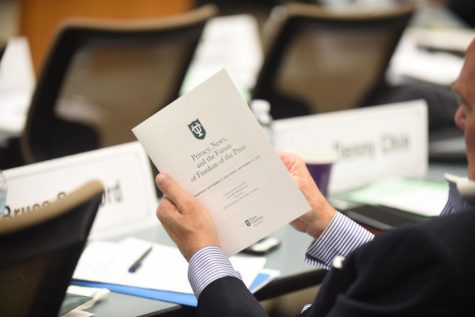Tulane Law School hosts free speech and privacy conference
As every law student learns, the right to free speech is held in high esteem in the legal system. But what happens when the right to free speech, guaranteed by the First Amendment, conflicts with the right to privacy?
Tulane University Law School hosted a “Privacy, News and the Future of Freedom of the Press” conference on Sept. 27-28 to address this issue. Over the course of two days, seven panels of journalists, professors, attorneys and leaders of the media industry discussed the intersection of the freedom of the press and the right to privacy.
The conference began with the screening of the CNN/Sundance documentary “Holy Hell.” Director Will Allen was a member of the Buddhafield cult for 22 years and put together the documentary from the inside. His controversial reporting methods have been at the crux of the privacy versus free speech debate.
Following the screening, Allen himself answered questions regarding the privacy concerns for the cult and the newsworthiness of its practices. In addition to the legal concerns, the discussion touched upon the ethical aspect of the issue.
On Friday, six panels took place. The first panel discussed the infamous Bollea v. Gawker case, where Hulk Hogan successfully sued Gawker Media for publishing portions of his sex tape. The morning sessions also addressed the changing business model of journalism and the changing norms within journalism.
The lunchtime talk featured The Honorable Denny Chin, providing a view from the Bench about the privacy and newsworthiness discussion. The panels in the afternoon addressed the rising distrust in journalism in the legal arena and in the public, and the conference concluded with a discussion about the future of journalism.
The issues raised at the conference extend beyond mere intellectual curiosity, according to Steve Beatty, former editor of The Lens and consultant to the Local Independent Online News.
“It is important to keep holding these because one of the things we touched on at the end was people’s realization and understanding and appreciation for what journalism and privacy concerns are,” Beatty said. “[Journalists] take these into account. We don’t do these things lightly. When we get into someone’s personal life, there’s usually a darn good reason for it.”
The First Amendment secures the freedom of press in U.S. In practice, however, where exactly the legal system draws the line between privacy violation and free speech is still unclear.
Amy Gajda, Class of 1937 Professor of Law at Tulane University Law School, moderated the panels. The conference was underwritten by a Carol Lavin Bernick Faculty Grant received by Gajda, who has focused her research on the topic of free speech and privacy.
In European courts, the “right to be forgotten” limits the freedom of press. Though the U.S. seems to lack an equivalent law that secures individual privacy against the public value of information, Gajda’s research suggests that recently a number of federal and state courts made decisions that protect individual privacy rights, setting up boundaries for the scope of the press.
Bringing the legal world and the press together, the panel was fundamental in taking a solution-oriented path in privacy issues, according to Gajda.
“Judges need to understand what journalism is in order to rule correctly, in order to give the press the freedom that it needs to report on important stories,” Gajda said.
Leave a Comment
Your donation will support the student journalists of Tulane University. Your contribution will allow us to purchase equipment and cover our annual website hosting costs.





Christian Stewart • Apr 23, 2019 at 9:35 am
Privacy and free speech are tightly related, so I think it’s good that these two topics are being linked together. In regards to journalism, privacy is vital for getting information from sources that need to remain anonymous. Without privacy, information would not flow as easily because these sources would be concerned about the consequences of sharing sensitive information.
This article (https://choosetoencrypt.com/privacy/why-you-should-take-your-privacy-seriously/) shares why privacy matters–And it goes beyond just giving anonymous sources the ability to share their information. Privacy limits the powers of authoritarian regimes, because it limits their ability to monitor and control citizens’ actions. It also lets people change their beliefs without being tied to their past claims or statements.